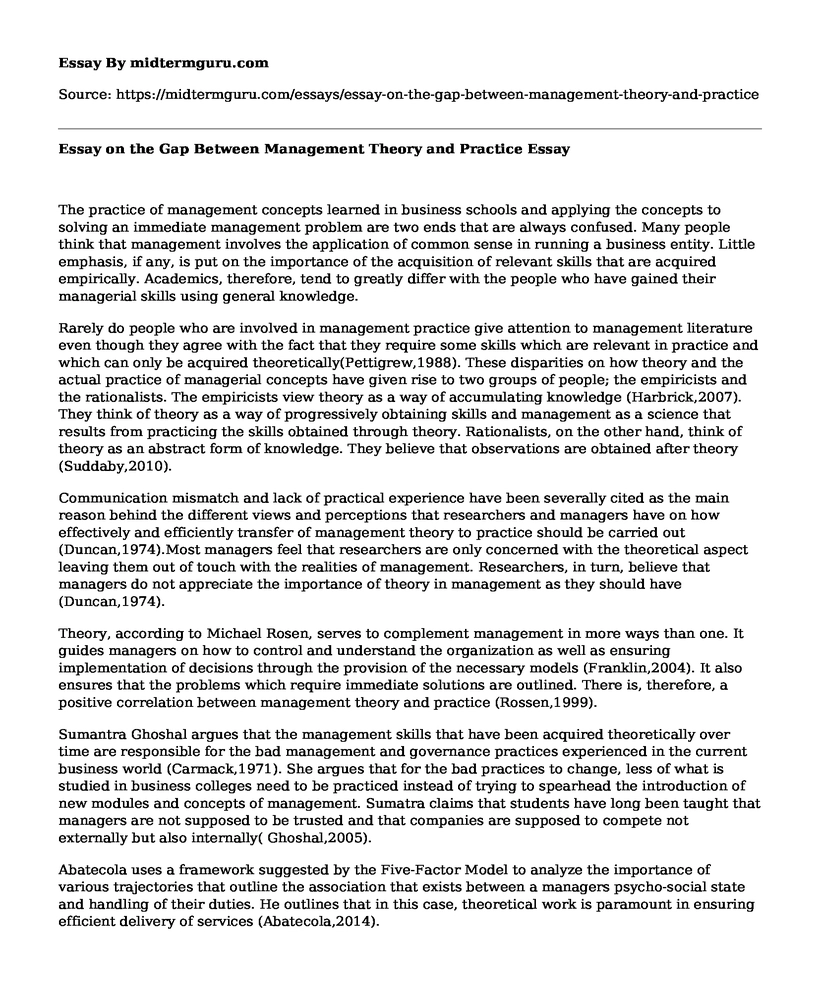The practice of management concepts learned in business schools and applying the concepts to solving an immediate management problem are two ends that are always confused. Many people think that management involves the application of common sense in running a business entity. Little emphasis, if any, is put on the importance of the acquisition of relevant skills that are acquired empirically. Academics, therefore, tend to greatly differ with the people who have gained their managerial skills using general knowledge.
Rarely do people who are involved in management practice give attention to management literature even though they agree with the fact that they require some skills which are relevant in practice and which can only be acquired theoretically(Pettigrew,1988). These disparities on how theory and the actual practice of managerial concepts have given rise to two groups of people; the empiricists and the rationalists. The empiricists view theory as a way of accumulating knowledge (Harbrick,2007). They think of theory as a way of progressively obtaining skills and management as a science that results from practicing the skills obtained through theory. Rationalists, on the other hand, think of theory as an abstract form of knowledge. They believe that observations are obtained after theory (Suddaby,2010).
Communication mismatch and lack of practical experience have been severally cited as the main reason behind the different views and perceptions that researchers and managers have on how effectively and efficiently transfer of management theory to practice should be carried out (Duncan,1974).Most managers feel that researchers are only concerned with the theoretical aspect leaving them out of touch with the realities of management. Researchers, in turn, believe that managers do not appreciate the importance of theory in management as they should have (Duncan,1974).
Theory, according to Michael Rosen, serves to complement management in more ways than one. It guides managers on how to control and understand the organization as well as ensuring implementation of decisions through the provision of the necessary models (Franklin,2004). It also ensures that the problems which require immediate solutions are outlined. There is, therefore, a positive correlation between management theory and practice (Rossen,1999).
Sumantra Ghoshal argues that the management skills that have been acquired theoretically over time are responsible for the bad management and governance practices experienced in the current business world (Carmack,1971). She argues that for the bad practices to change, less of what is studied in business colleges need to be practiced instead of trying to spearhead the introduction of new modules and concepts of management. Sumatra claims that students have long been taught that managers are not supposed to be trusted and that companies are supposed to compete not externally but also internally( Ghoshal,2005).
Abatecola uses a framework suggested by the Five-Factor Model to analyze the importance of various trajectories that outline the association that exists between a managers psycho-social state and handling of their duties. He outlines that in this case, theoretical work is paramount in ensuring efficient delivery of services (Abatecola,2014).
Most of the disparities that exist between the theoretical aspect of management and its practice are as a result of the difficulties that are involved in testing the strategic management theories (Miller).Miller advocates for the adoption of a four-step approach and deployment of research methods that aim at testing the various management theories to determine their applicability(Miller,2011).
References
Abatecola, G. (2014). Research in organizational evolution. What comes next?. European Management Journal, 32(3), 434-443.
Brenner, V. C., Carmack, C. W., & Weinstein, M. G. (1971). An empirical test of the motivation-hygiene theory. Journal of Accounting Research, 359-366.
Duncan, W. J. (1974). Transferring management theory to practice. Academy of Management Journal, 17(4), 724-738.
Franklin, P. (2004). Problematics in management theory and practice. Strategic Change, 13(7), 383-404.
Ghoshal, S. (2005). Bad management theories are destroying good management practices. Academy of Management learning & education, 4(1), 75-91.
Hambrick, D. C. (2007). The field of management's devotion to theory: Too much of a good thing?. Academy of Management Journal, 50(6), 1346-1352.
Kirkman, B. L., & Rosen, B. (1999). Beyond self-management: Antecedents and consequences of team empowerment. Academy of Management journal, 42(1), 58-74.
Miller, K. D., & Tsang, E. W. (2011). Testing management theories: critical realist philosophy and research methods. Strategic Management Journal, 32(2), 139-158.
Pettigrew, A. (1988). The management of strategic change. Wiley-Blackwell.
Suddaby, R. (2010). Challenges for institutional theory. Journal of Management Inquiry, 19(1), 14-20.
Cite this page
Essay on the Gap Between Management Theory and Practice. (2021, May 26). Retrieved from https://midtermguru.com/essays/essay-on-the-gap-between-management-theory-and-practice
If you are the original author of this essay and no longer wish to have it published on the midtermguru.com website, please click below to request its removal:
- Essay on Employee Motivation in Nursing
- Changes in Strategy and Strategic Direction Over the Last Ten Years of Thai Union
- Incentives Case Study
- Essay Sample on Production Plan
- Johns Hopkins Medicine Strategic Plan
- Leadership in Workplace: Fundamentals for Success - Essay Sample
- Leaders vs Managers: Who Steers the Sports Industry? - Essay Sample







